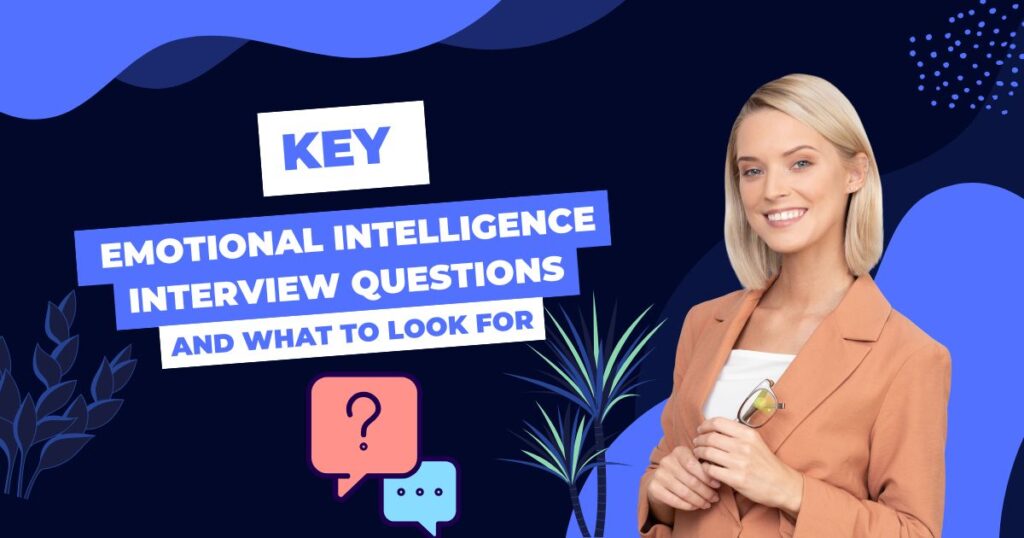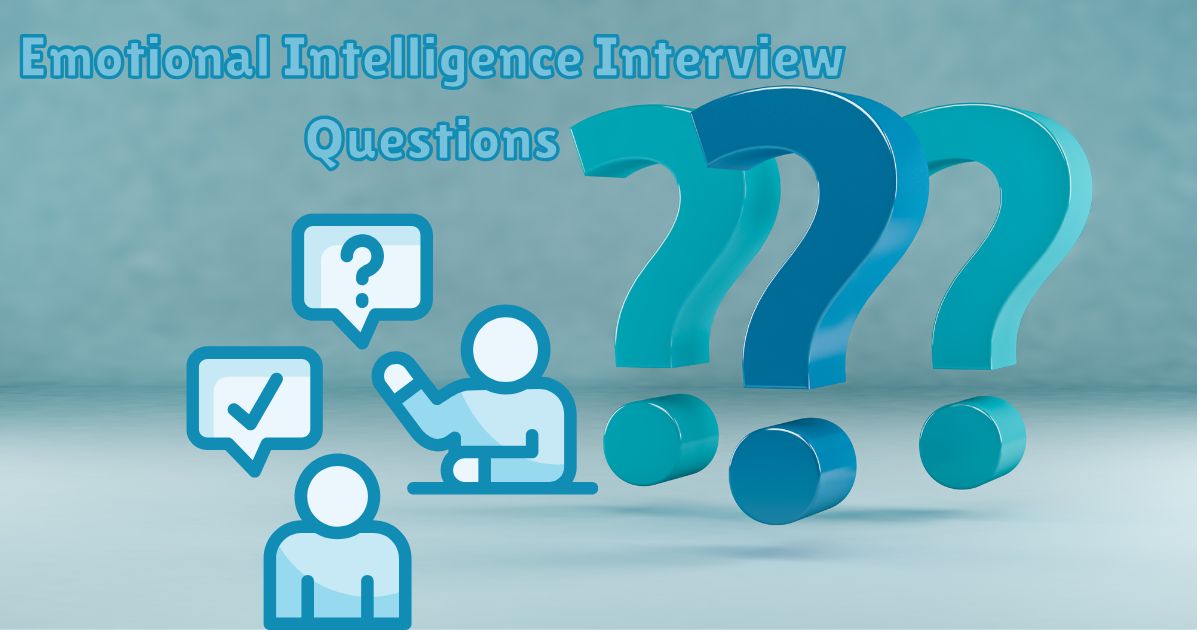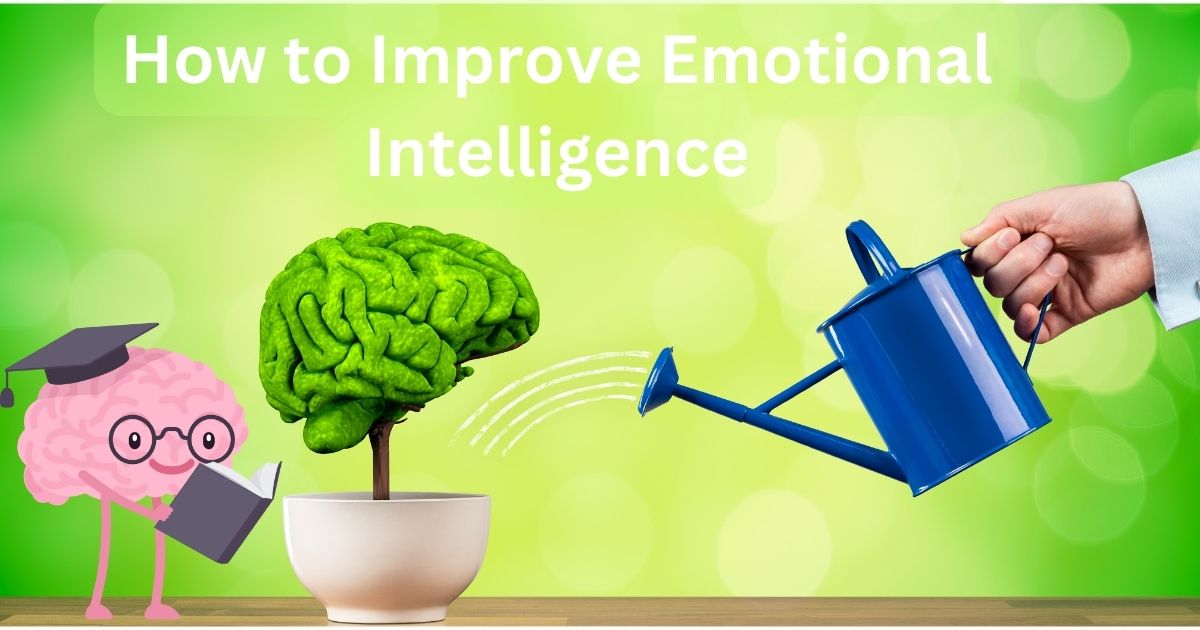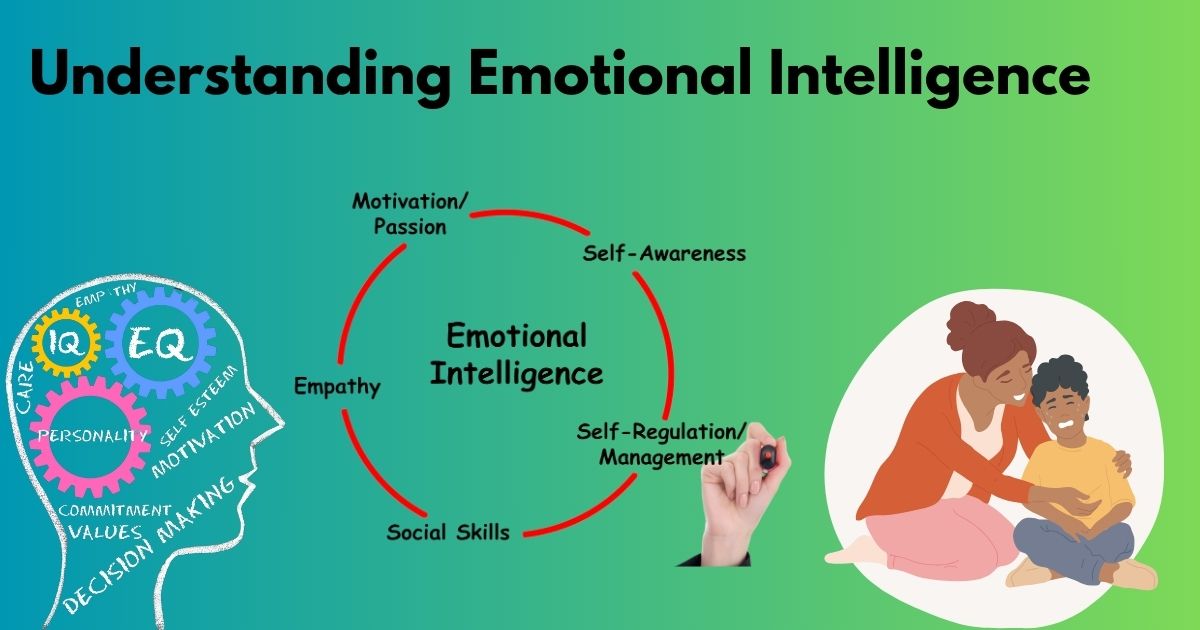Emotional Intelligence Interview Questions
Introduction
Interviewing for emotional intelligence can be transformative for companies. It can reveal qualities that aren’t obvious on a continued, but are basic for long-term success.
In this guide, we’ll see at key emotional Intelligence interview questions and give insights into what reactions to tune in for, along with some basic tips.
Key Emotional Intelligence Interview Questions and What to Look For

Key Emotional Intelligence Interview Questions and What to Look For
1. Self-Awareness Questions
Self-awareness is the establishment of emotional intelligence. It includes recognizing one’s claim feelings, qualities, and limitations.
- “Can you portray a time when you got constructive feedback? How did you handle it?”
- What to see for: See for candidates who can openly examine feedback and appear an eagerness to learn and improve. A solid reply demonstrates an understanding of their development regions and a non-defensive attitude.
- “How do you assess your strengths and weaknesses?”
- What to look for: Candidates with high self-awareness can recognize their possess qualities and confinements. See for reactions that reflect practical self-assessment rather than generic or overly positive descriptions.
2. Self-Regulation Questions
“Emotional Intelligence Interview Questions” Self-regulation includes managing one’s emotions, particularly in stressful circumstances. People with great self-regulation handle struggle smoothly and stay calm under pressure.
| Question |
What to Look For |
| “Tell me about a time you faced a stressful situation at work.” |
Ability to manage emotions, maintain professionalism, and use effective coping techniques. |
| “How do you handle conflict in the workplace?” |
Calmness, constructive conflict resolution, and a solution-focused approach. |
- “Tell me about a time you faced a stressful situation at work. How did you respond?”
- What to look for: Candidates ought to describe how they managed their feelings and kept up professionalism. Tune in for techniques they utilized to adapt with push and how they prevented it from affecting their work.
- “How do you ordinarily handle strife in the workplace?”
- What to see for: Viable reactions show a capacity to remain calm and find constructive arrangements rather than heightening conflicts. Candidates should say how they approach strife openly, avoid fault, and centre on resolving the issue.
3. Inspiration Questions
Motivated people are frequently driven by inner variables rather than outside rewards. Asking about inspiration makes a difference to reveal if a candidate’s values adjust with the company culture.
- “What motivates you to achieve your goals?”
- What to look for: See for natural sparks, like personal development, achievement, and collaboration, rather than simply external rewards. Candidates with tall EI often discover satisfaction in the work itself, appearing a passion for their field.
- “Describe a time when you remained propelled during a challenging project.”
- What to look for: Candidates should illustrate versatility and a positive outlook, even amid difficult times. Their reply should reflect their commitment and perseverance.
4. Empathy Questions
“Emotional Intelligence Interview Questions” Empathy is basic for understanding and relating to others. This quality helps construct a positive and inclusive workplace, and also can improve emotional intelligence.
- “How do you approach understanding a colleague’s perspective when you disagree with them?”
- What to look for: Perfect candidates discuss tuning in effectively, recognizing distinctive perspectives, and appearing in regard for others’ suppositions. Tall EI reactions will incorporate cases of how they looked for to get it, or maybe than dismiss others’ perspectives.
- “Share an example of how you backed a colleague through a difficult time.”
- What to look for: Candidates who appear empathy get it when others are battling and know how to offer support. See for examples of benevolence, tolerance, and valuable assistance.
5. Social Skills Questions
“Emotional Intelligence Interview Questions” Social skills are crucial for collaboration and struggle determination. Employees with strong social abilities are often adaptable, extraordinary at organizing, and comfortable communicating.
- “How do you construct connections with new group members?”
- What to look for: Effective reactions appear a proactive approach to building believe, such as open communication, active tuning in, and finding common ground.
- “Describe a time when you worked successfully with the group to achieve the goal.”
- What to look for: Candidates should outline their capacity to work well in team setting, appearing how they contributed positive dynamic and supported others
Tips for Interviewers to Assess Emotional Intelligence Effectively
1. Listen for Particular Examples
Encourage candidates to share particular cases rather than unclear answers. Real-world stories give superior experiences into how they carry on in different situations.
2. Observe Non-Verbal Cues
Body language and tone can reveal much around a candidate’s consolation with the theme and their level of sympathy or self-awareness.
3. Ask Follow-Up Questions
Digging deeper helps get it the candidate’s thought to prepare. If their beginning reply appears superficial, inquire follow-up questions like, “What was the result?” or “How did that encounter change your approach?”
4. Balance EI Questions with Technical Questions
While emotional intelligence is significant, keep in mind that it complements, rather than replaces technical skills. A well-rounded candidate has both.
FAQs about Emotional Intelligence Interview Questions
Why is emotional intelligence important in hiring?
Emotional intelligence questions contributes to healthier workplace dynamics, more effective communication, and resilience. Employees with high EI can adapt well, resolve conflicts effectively, and inspire their teams.
How do EI traits improve team dynamics and productivity?
Teams with high EI members tend to have better collaboration and reduced conflicts. Employees are more likely to be supportive, productive, and motivated, contributing to higher overall team success.
What are signs of low emotional intelligence in responses?
Indicators may include an inability to reflect on past mistakes, defensiveness, lack of empathy, or difficulty handling stress. Watch for responses that seem overly guarded or blame others.
Conclusion
Emotional intelligence is an important characteristic that can change a working environment. By incorporating EI-focused questions into interviews, companies can distinguish candidates who not only have the specialized skills but also the interpersonal qualities to flourish in diverse and dynamic situations.
These individuals will likely contribute positively to work environment culture, team morale, and overall efficiency. Hiring for emotional intelligence doesn’t fair fill positions; it builds flexible, connected, and steady teams for long-term success.





